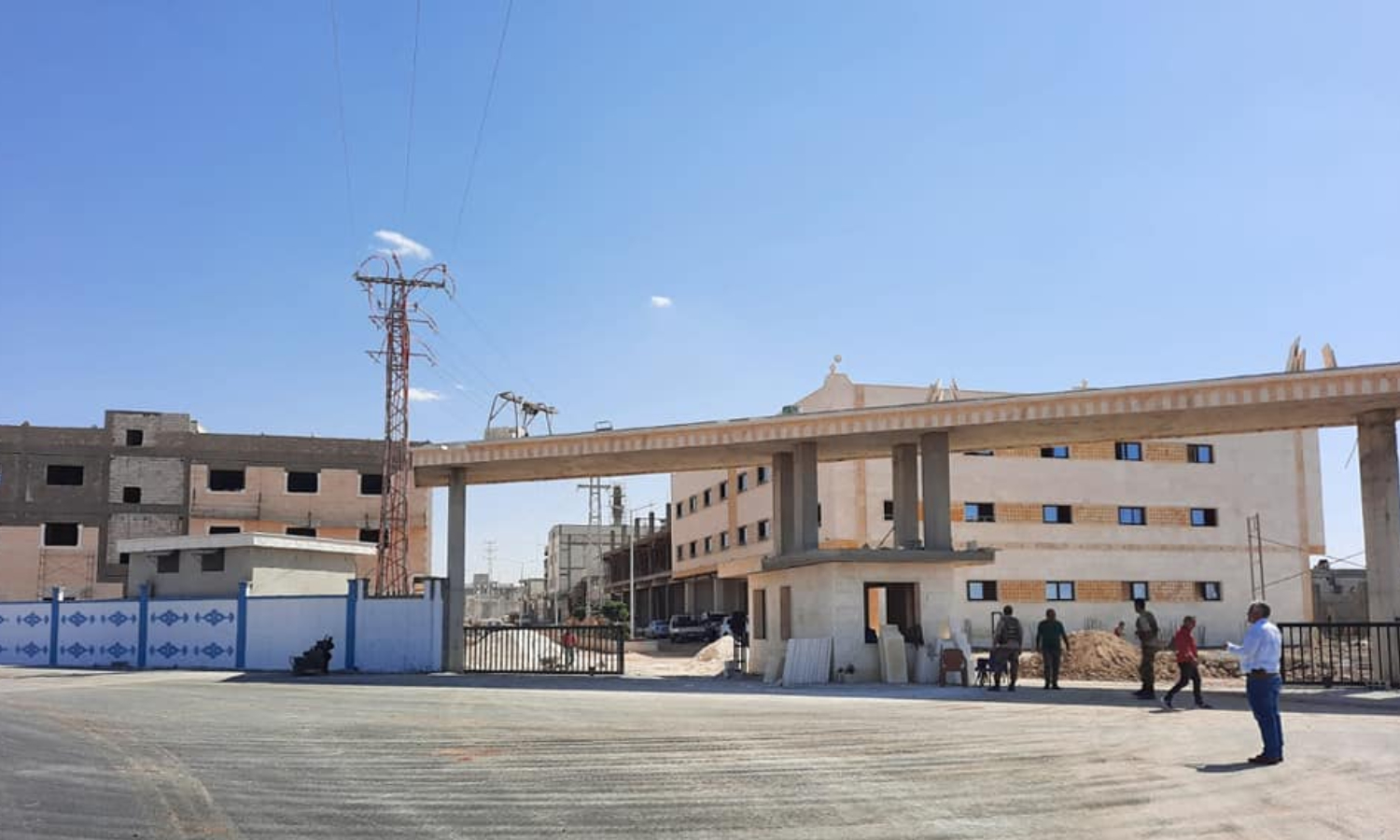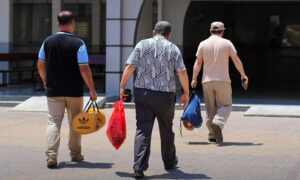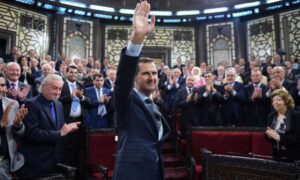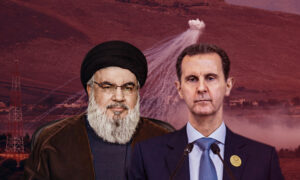Enab Baladi – Diana Rahima
The decision of the US Treasury Department to exempt investors and private companies from US sanctions and the Caesar Act in northeastern and western Syria may change many of the current facts and policies after a US stalemate in dealing with the Syrian file since the arrival of President Joe Biden to the White House.
Matters are still closer to uncertainty regarding the impact of the sanctions exemptions on the region in terms of political and economic terms and the Syrian regime’s benefit from it, and how they are invested on the ground by the Kurdish-led Autonomous Administration in northeastern Syria, or in areas under the control of the Syrian opposition’s “Interim Government” in the northwest.
Enab Baladi discussed the political and economic changes that would result from the decision of exemptions and exceptions with a number of researchers and political and economic experts who are familiar with the region.
Exemptions
The US administration had worked on the exemptions decision since early 2022 when the US officials informed the Syrian-American organizations, then the Syrian Opposition’s National Coalition, and then the Turkish government, last February, after which the countries supporting Syria were informed at the Brussels VI Conference held in early May, to be officially announced at the ministerial meeting of the International Coalition against the Islamic State (IS) group, on 11 May, according to the former Syrian diplomat Bassam Barabandi.
The declared goal of the decision was to support the efforts of the Syrian Democratic Forces (SDF) to fight “terrorism,” meaning that the region must be stable for the forces to be able to fight IS, but the Americans supported the idea to benefit financially from it through the organizations, and its purpose was to include part of Idlib as well.
With Russian approval?
Barabandi denied in an interview with Enab Baladi the existence of any gap in coordination between the American and Russian sides in the issue of exemptions because Russia bought the share of a British oil company located in al-Hasakah city with American approval without naming it.
The veteran diplomat believes that the decision is the beginning of a new division of Syria, separating an entire region from Syria and giving it an army, flag, borders, and economic privileges, which opens the door for Alawites, Druze, and Christians to claim their own areas.”
The Americans should have established a new social contract between the religious minorities and main societal components in the Syrian Jazira region, including Arabs, Kurds, Muslims, and Christians, within the framework of a living democratic model that reflects the future shape of Syria that the Syrians have long demanded, under security, military, and economic cover, Barabandi added.
US-Turkish rapprochement
Maan Talaa, a political researcher at the Omran Center for Strategic Studies, told Enab Baladi that the US policy has helped to entrench the scenario of “geography being entrenched in Syria.”
The sanctions exceptions are reflected in the support of international and regional organizations after the US considered them as part of the demographic change that Turkey seeks in the areas under its control.
The areas covered by the exemptions include governorates under the control of the US-backed SDF and areas under the control of the Turkish-backed Syrian National Army (SNA), with the excluding of Afrin and the Idlib region.
Talaa believes that the inclusion of the Peace Spring Operations areas (the towns of Ras al-Ain, northwest of al-Hasakah, and Tal Abyad, north of Raqqa) in the exempted areas is a “goodwill gesture” by Washington towards Ankara, which says in its official position that it is against the US exceptions, but Turkey is practically today opened to the entire Euphrates Shield area of operations, from Jarablus to the borders of al-Rai and Azaz towns.
There are also features preparing for an incomplete rapprochement between Washington and Ankara in the Syrian file, imposed by the general atmosphere, especially due to the Russian war on Ukraine.
The file of exemptions is read within the freezing scenario as strengthening “decentralization” in light of the faltering of the constitutional process in its seventh round and the absence of a political and legal impact of this process, in addition to political incompatibility in the region, and the Syrian file retreating from the international arena while the Ukrainian file came to the fore, according to Talaa.
Thus, it will lead to a transition from the idea of administrative and security borders to political borders because all organizations will focus their efforts in this area, which will lead in one way or another to a ceasefire agreement.
The expert assumes that if an agreement is reached between the US position and the Turkish position, in addition to negotiating with Turkey and the EU to admit Finland and Sweden to the NATO in exchange for a safe zone in Syria, then the main actors in the region will agree, so that the Russian actor, which does not have the ability to create larger areas, remains as long as it preserves its strategic areas of influence, and is reassured that Turkey is still taking the role of mediator in the Ukraine issue between the US and Russian parties.
Shifts between rivals
To understand the nature of the relationship between the Autonomous Administration and the Syrian regime, we must return to the starting point in 2012, according to what the researcher in eastern Euphrates affairs, Badr Mulla Rashid, said in a previous interview with Enab Baladi, who referred to the regime’s withdrawal from the area at that time in favor of the Democratic Union Party (PYD), within an agreement that he described as “its aspects can be traced without access to its direct clauses.”
The agreement governed the relationship between the two parties, leading to the entry of the International Coalition Forces (ICF) into Syria and their formation of the SDF at the end of 2015, and the alliance’s continued support until now, which changed the nature of the PYD and its associated systems, turning it into a local competitor to the central authority in Damascus, explaining the tension in the relationship between the two parties (the Syrian regime and the PYD).
Rashid considered that despite the agreement of the Syrian regime and the Autonomous Administration on many points, the support obtained by the PYD granted power and control that the party does not want to give up today, just as the Syrian regime does not want to enter into any agreement that confirms the powerful party’s control in the current form, since it is represented by a strong and organized military arm, the SDF, in addition to controlling natural resources.
Syrian regime condemns
In a statement on 13 May, the Syrian Ministry of Foreign Affairs and Expatriates condemned Washington’s exclusion of areas in northeastern and western Syria from the sanctions imposed due to the Caesar Act.
The ministry said, “The Syrian Arab Republic was not surprised by the statement issued by the US State Department regarding granting a license to carry out economic activities in northeastern and western Syria because successive administrations were behind the (terrorist) war that it has been exposed to for ten years until now.”
The ministry accused Washington of providing aid to armed “terrorist organizations” in northeastern and northwestern Syria, which has led to the destruction of the capabilities of the Syrian economy and the looting of its wealth of cotton, oil, wheat, and antiquities, according to the statement.
The researcher Talaa believes that there is sufficient ground for the Syrian regime to evade sanctions and benefit from these exceptions through networks, whether they are mediators of some “independent” political parties affiliated with the regime, led by some clan figures, or through the black market introducing new figures to the region and concluding agreements with them.
However, this was related to the nature of the previous relationship between the regime and the Autonomous Administration, while the recent transformations make this approach a path of challenges.
There was a relationship, whether by handing over some areas, exchanging some roles, or even defining the Autonomous Administration as a third party, separated from the regime and the opposition.
With the change in the US strategy and the increase in the level of support for the “Administration” and its orientation towards federalism, the terms of the relationship changed, which was reflected even in the level of mutual visits to the coastal Hmeimim airbase.
The changing relationship increases the challenges of the regime’s ability to exploit exemptions but does not negate it, as the amount of benefit that the Syrian regime will obtain according to these variables is present but not as it was expected.
Syrian regime’s deadlock
According to Talaa, Washington does not think and does not encourage normalizing the relationship with the regime and even the relationship with the UAE, which was considered a major political victory for al-Assad. It realizes that it needs to search for qualitative paths that do not contradict the Caesar Act.
Even the file of restoring the regime to the Arab League is linked to the political process, so these exceptions have once again brought the regime back to a deadlock at the political level and the level of managing its stifling economic crises, Talaa added.
The Syrian regime has two options: being flexible by relaunching negotiations with the Autonomous Administration and giving it more advantages in its demand for “administrative decentralization.”
The second option is to put pressure on the Autonomous Administration by presenting the scenario of returning to the region, whether through a military sense or by creating negotiations with Turkey in this context, or by pitting the situation by exploiting the weaknesses represented in the demands of tribes and some societal components for a greater role, or through a darker scenario by moving sleeper cells associated with Iran or the Islamic State group.
Talaa believes that the regime is waiting for the effects of the US decision, such as its impact and cost, to start its strategy that begins with flexibility by strengthening the principle of negotiations, but this is related to the extent of the benefit that will accrue to it.
Centralization of decision-making
Any investment or improvement of the economic landscape is not only related to the available material resources, but also needs local government bodies that enjoy mechanisms of transparency, oversight, regulation of civil work, and decentralization of decision-making.
But the relationship between the Kurdistan Workers’ Party (PKK) and the Autonomous Administration is one of submission from one party to the other, according to Talaa.
For example, is it possible for any party that does not recognize the Autonomous Administration or has a political position on it to have the right to present a vision to the residents of Raqqa, which will serve a political party somewhere?
This enhances the strength of the political component, whose Syrian part may, of course, be subject to dialogue or negotiations with a government that is considered a “shadow government,” according to Talaa.
New laws require new political map
The Qamishli-based researcher Shivan Ibrahim, who covers Kurdish affairs, believes that the exemption decision is not directed at non-local investors but rather at international transcontinental companies, which will shape international policies.
No one can stand in the way of the exemptions decision, especially in light of some indicators that consider the decision as part of a political settlement to transfer Qatari gas, the gas of the Kurdistan region of Iraq, and the gas located in northeastern Syria to Turkey and then to Europe, to get rid of Russian blackmail in the gas issue, according to Ibrahim.
The success of this project depends on the extent to which the structure of the Autonomous Administration has been changed and restructured and the removal of any influence or complete separation between the legislative, judicial, and executive powers, and the absence of an opportunity or presence for domination by political or military figures.
This means that there cannot be a military, political, or administrative figure controlling all the files, as this will cause a conflict of interest and will lead to the failure of the project.
The presence of American companies in the region means the necessity of having a law and a political system that protects these companies, while most of the laws in northeastern and western Syria are subject to amendment and change at any moment. Therefore, companies that have a huge capital of millions and billions of US dollars will not enter the region without a radical change in its political and administrative structure, which will inevitably mean changing stereotypes, laws, and social reasoning throughout northern Syria and creating laws that protect these companies, Ibrahim said.
It will also require political stability and internal reconciliation at the political level, meaning that a Kurdish-Kurdish agreement must take place and then a Kurdish agreement with the rest of the components, which must have good relations with Turkey and with the Kurdistan region of Iraq.
The Kurdish researcher considered that it is not logical to exclude the Semalka border crossing or the other crossings with Turkey, as most of the countries that enter for reconstruction after the conflict are the border countries (neighboring countries).
The entry of American companies through Turkey and through the Kurdistan region of Iraq into northern Syria is a matter that calls for reconciliation and political settlements, even with the Syrian government itself, because Russia will not accept this situation unless there is an item protecting its interests.
Therefore, Ibrahim believes that excluding oil and gas from the issue will provide Damascus and the areas controlled by the Syrian government with a portion of its energy derivatives needs.
He stressed that when there is economic stability and local consensus in northeastern Syria and a Kurdish-Kurdish consensus, and then Kurdish consensus with the rest of the components in the region and with northwest Syria as well, a kind of new political regime will be formed.
Investment law
|
Maybe we will witness the birth of something new that is against federalism and contrary to political centralization. Damascus may remain central, and perhaps northern Syria will have a new situation. The implementation of this law will inevitably mean moving the region to a new political phase. Kurdish affairs researcher Shivan Ibrahim |
The Economic Commission of the Autonomous Administration in northeastern Syria had announced its intention to issue a new investment law after excluding the region from the US sanctions imposed under the Caesar Act.
Salman Baroudo, the co-chair of the economic commission in the Autonomous Administration, said in an interview with North Press Agency on 15 May that the “Administration” intends to issue a new investment law and that the law, if issued, will create an atmosphere of confidence for investors and it will be possible to establish projects in the region.
He also stressed that the exemption from the Caesar Act sanctions would contribute to the economic revival of the region.
The Autonomous Administration will focus the investment proposal on agricultural projects and self-sufficiency projects to “improve the living conditions of the population and achieve food security in the region,” Baroudo said.
The US Treasury made it clear that it did not allow any transactions with the regime’s government or those classified under US sanctions during the 11-year war in Syria.
Limited economic impact
Benefits of the Syrian regime
The US State Department had clarified its position regarding licenses related to exemption from the sanctions of the Caesar Act in areas of northeastern and western Syria.
In an email interview with Enab Baladi on 16 May, Samuel Warburg, the Regional Spokesman for the US State Department, said that General License No. 22 in Syria is not an exception to the sanctions.
The license authorizes specific economic activities in some areas not under the control of the regime in northeastern and western Syria, according to Warburg.
Karam Shaar, Syrian professor in economics and director of research at the Operations and Policy Center (OPC), believes that the expected positive impact of the sanctions exemptions is basically limited to the targeted areas, that is, those excluded in the first degree.
However, the Syrian regime may benefit due to the overlap between the excluded and non-excluded areas, for example, there are parts of the city of Qamishli under the regime’s control, in addition to many important areas that are the city’s mainstay and are also under its control, such as the airport, which is outside the SDF’s areas of control.
These areas may benefit from sanctions-related exceptions, but because the overall impact is so small, the indirect benefit of the Syrian regime will be even more limited.
Shaar pointed out that the difficulties that investors are currently facing from the private sector or even from international institutions working in the field of development, such as the World Bank or others, are mainly sanctions, but in addition to other problems that have not yet been resolved, as there is no clarity in the laws regulating investment. The Autonomous Administration says it is working on the matter, but there is still no clarity, he added.
Shaar exemplifies that if a company started working in the power field and used the oil used by the Autonomous Administration, and the political situation in the region changed, and Syria returned under the shadow of one government, so the question is: within what law will the company operate, and what will guarantee this company that the laws that will be imposed on it will not be unfair laws and that its rights will be preserved, the economic expert argued.
Mohammad al-Abdullah, an economic researcher at the Omran Center for Strategic Studies, also believes that exceptions to the US sanctions will not have their economic effects in the short term, and in this part, it is worth distinguishing between the two areas of influence of the Autonomous Administration and Turkey in terms of the expected impact on each of them.
No big change in Northeastern Syria
Al-Abdullah says that there will not be much change in what is in the areas under Turkish influence in the countryside of Aleppo and parts of Raqqa and al-Hasakah, these areas are originally where investments by Turkish and local companies are spread, according to the laws currently in force, and it is not expected that foreign companies will come to invest inside them for political reasons.
In addition, the security situation is still below the level required for the establishment of large investment projects that contribute to alleviating unemployment rates and improving living conditions.

The industrial zone in al-Rai city in the countryside of Aleppo (Al-Rai Chamber of Industry and Commerce)
Al-Abdullah does not expect the return of commercial traffic with the Syrian regime, as there is a local refusal to reopen the internal crossings with it.
However, this does not negate the existence of financial and commercial relations between these areas and the regime-controlled areas that are likely to develop in the future.
Obstacles in the Northeast
In the Autonomous Administration areas, where oil is the main resource, these areas are still not qualified to attract huge investments for reasons related to the lack of investment opportunities available in the economic sectors, the majority of which were concentrated after 2014 in trade and real estate.
The private sector in northeastern Syria has not registered a noticeable development since the Autonomous Administration took over control, and it has remained limited to food production as a whole, according to al-Abdullah.
Absence of the banking sector
The economic researcher also pointed out the absence of effective laws regulating foreign direct investment, as well as underdevelopment, tax differentiation, and lack of transparency by the economic management of the ruling authority.
On the other hand, the Syrian regime still has a foothold within the northeastern region through some government institutions and its dependence on the regime’s government banks to secure liquidity in the market, without these banks having any role in economic activities.
Therefore, the almost complete absence of the banking sector, which represents one of the important foundations for the launch of investments, constitutes a major challenge in this regard, in light of the ban on dealing with the financial institutions of the Syrian regime.
In addition to the foregoing, the significant influence of the economic networks associated with the Autonomous Administration, which dominate the majority of profitable investments, represents a major obstacle to future investments in this region, given the privileges offered to them.
Most of these networks are local businessmen linked to influential officials in the powerful Kurdish PYD, whose influence has taken root over the past years, and they have almost completely controlled commercial deals with the Kurdistan region, the opposition-held areas, and the regime-controlled areas.
Meanwhile, some local residents rely on taking advantage of these exemptions to revitalize the agriculture and livestock sectors, given the available agricultural spaces and local expertise in this field.
Oil
The foreign investment in the oil sector is discouraging for reasons related to the reluctance of major oil companies to enter this region, which is witnessing intense polarization between a group of actors located in the northeast and turbulent security and economic conditions that discourage companies from investing in it.
Also, the oil stock, its quality, and the cost of extracting and marketing, it is not that tempting to take a risk and work within these areas, according to researcher al-Abdullah, and consequently, the low economic feasibility of embarking on this investment.
The return of some international oil companies and their guarantors and the provision of space for production, sale, and marketing through legitimate international channels requires regional and international consensus.
The presence of any foreign company in this region in the future must be viewed within the framework of the political symbolism through which Washington is trying to legitimize the Autonomous Administration as a local authority.
However, the obstacles related to the fear of the Turkish position opposing lifting sanctions on these areas may pose a challenge to foreign companies to undertake such a move, according to al-Abdullah.
Thus, it is not possible to compare the Kurdistan Region of Iraq with the areas of the Autonomous Administration, given the latter’s loss of the legitimate authority recognized regionally and internationally and the lack of a sustainable political solution in Syria.
The economic expert believes that Washington is focusing more on lifting the region out of poverty to protect it from the IS group than on trying to besiege the Syrian regime, and it is fully aware of the impossibility of cutting commercial and financial contacts with the regime-controlled areas.
Meanwhile, Damascus will benefit from this step, as it is not possible to be certain about the possibility of economically separating the areas of control in Syria from each other due to the great overlap, and consequently, any possible economic recovery within the areas from which the embargo has been lifted, its effects will be conveyed in the future to the areas under the control of the regime.
if you think the article contain wrong information or you have additional details Send Correction
النسخة العربية من المقال
-
Follow us :
Most viewed
- Syrians pack their bags in Turkey
- After Turkey and the opposition, SDF shows willingness to dialogue with Syrian regime
- After al-Hasakah, AANES releases prisoners in Raqqa
- Al-Assad meets Putin in Moscow without prior announcement
- Two hearings before trial: Is al-Sheikh case the start of Syrian trials in America?


















 A
A
A
A
A
A









 More In-Depth
More In-Depth